- Home
- News & Features
- News
- FY2019
- Papua New Guinea’s first national textbook: Japan’s knowledge is fully localized
News
March 26, 2020
Papua New Guinea’s first national textbook: Japan’s knowledge is fully localized
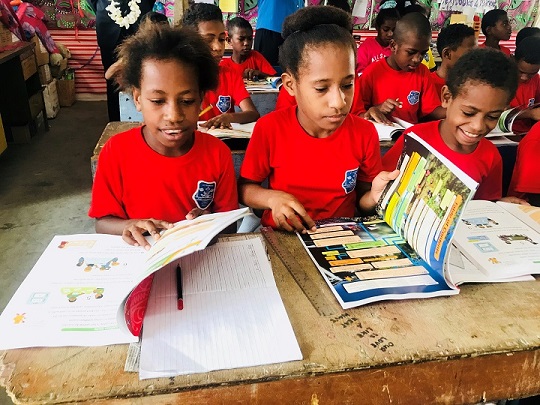 A new national textbook for each child; it’s going to be fun to study
A new national textbook for each child; it’s going to be fun to study
At the start of the new school year in February, in the hands of Papua New Guinea’s primary school students are their country’s first-ever national textbook. This is the first time the children had a mathematics textbook of their own. “The books are colorful with a lot of photographs and illustrations. It’s going to be fun to study,” they said with smile. A teacher also looked at the teacher’s manual and said happily, “It has the information necessary for teaching, and it also includes diagrams for the blackboard.”
Until this very moment, in Papua New Guinea, there have been no uniform national textbooks or teacher’s manuals. And the country has been facing a decline in children’s academic performance. JICA, being involved in education support for the country for many years, worked with Papua New Guinea’s National Department of Education to develop textbooks and teacher’s manuals for science and mathematics over the past four years to improve children’s academic performance.
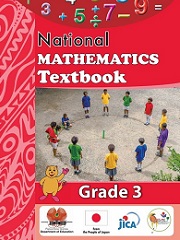 The third-grade primary school mathematics textbook
The third-grade primary school mathematics textbook
How to improve the quality of education
In addition to the shortage of teaching materials, a lack of teachers and poor teachers’ skills, the decline of children’s academic performance was caused by the “Outcomes Based Curriculum (OBC)” that was introduced in 2001 with support from Australia. In the OBC, although the target learning outcomes were clearly set out, there were no educational materials (textbooks and teacher’s manuals) for supporting the lessons. It was also difficult for teachers to assure the quality of classroom teaching. In 2014, Papua New Guinea decided to discontinue OBC.
Then, the “Standard Based Curriculum (SBC)” was introduced from 2019 in its place. It is a curriculum which educational materials were developed to support lessons and teaching, and was carried out to attain the education standards set by the National Department of Education. To achieve this, Papua New Guinea’s National Department of Education and JICA co-launched the “Project for Improving the Quality of Mathematics and Science Education” in 2016. The Project focused on the development of textbooks and teacher’s manuals on science and mathematics for third to sixth-grade primary school students across the country.
A Japanese textbook company provided know-how
While a Japanese textbook company provided the know-how, the textbooks developed this time were thoroughly localized; they were written in the English language which is easy for children and teachers in Papua New Guinea to understand, and they included photographs and contents suited to the culture and nature of the country. “Through continuous trial runs at schools, we completed textbooks that were suitable for Papua New Guinea, while making use of Japan’s know-how,” says Mr. ITO Akinori, a JICA Expert and a Chief Adviser of the project.
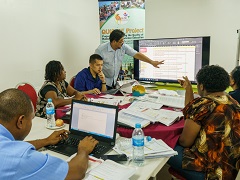 The textbooks were edited to suit local conditions, while making use of Japanese know-how
The textbooks were edited to suit local conditions, while making use of Japanese know-how
Mr. Ito says the passion of the Papua New Guinean people supported the development of textbooks. He spoke about the following episode:
“One night, when the staff from the National Department of Education and teachers from the pilot schools gathered to work on the textbook verification tasks, we suddenly experienced a blackout due to a power outage. It was already about 8 p.m., so I thought, ‘We’re going to finish today,’ but the members continued to work by turning on the lights of their smartphones. I was deeply moved by the fact that they did not stop working until the work was done.”
It took about four years to complete the science and mathematics textbooks and teacher’s manuals. Starting with the new term in February 2020, third- and fourth-grade students across the country will begin using the textbooks; from February 2021, fifth- and sixth-year students are scheduled to start using them.
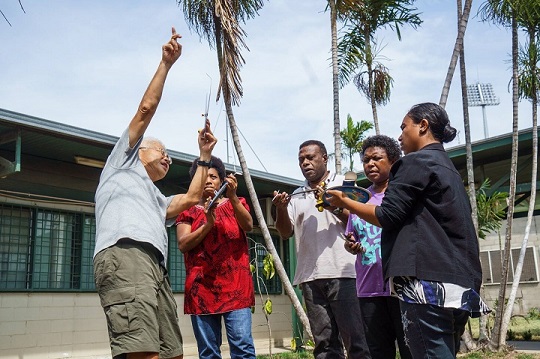 Textbook creation team testing science experiments
Textbook creation team testing science experiments
Creating training materials for teachers to promote the use of textbooks
The project also distributes training materials with DVDs for teachers so that new textbooks can be used without confusion by those who have been teaching without textbooks.
"The completion of the national textbooks does not mean that we have reached the goal. Rather, what is important is what we will do from now on. Going forward, I hope that the National Department of Education will thoroughly engage in raising awareness on how to use the textbooks and fully make use of them. While teachers in Papua New Guinea may not yet appreciate the value of the textbooks as we expected, the need may arise for other grades and different subjects as they continue to use them. I'm looking forward to positive reactions," says Mr. Ito. "There are still issues to be solved. We will continue to work together to improve the quality of education in Papua New Guinea," he said energetically.
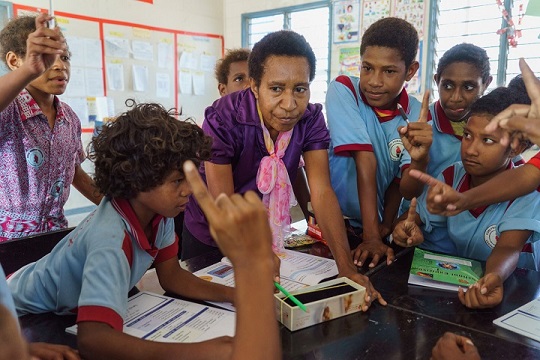 A science experiment using textbooks at a pilot school. Through repeated trials, the opinions of Papua New Guinean teachers in the field had been taken into account. As a result, a textbook customized for local conditions dubbed the country's first national textbook was completed
A science experiment using textbooks at a pilot school. Through repeated trials, the opinions of Papua New Guinean teachers in the field had been taken into account. As a result, a textbook customized for local conditions dubbed the country's first national textbook was completed
- About JICA
- News & Features
- Countries & Regions
- Our Work
- Thematic Issues
- Types of Assistance
- Partnerships with Other Development Partners
- Climate Change / Environmental and Social Considerations
- Evaluations
- Compliance and Anti-corruption
- Science and Technology Cooperation on Global Issues
- Research
- JICA Development Studies Program / JICA Chair
- Support for the Acceptance of Foreign HRs / Multicultural and Inclusive Community
- Publications
- Investor Relations





